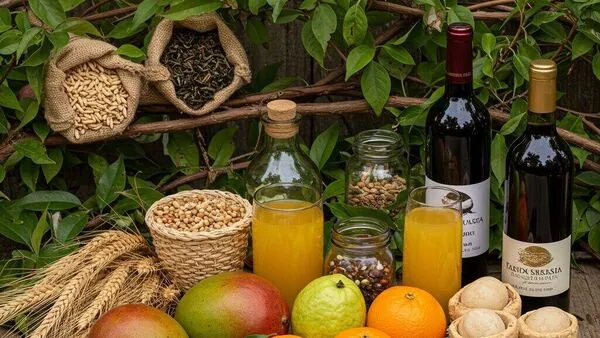India, Australia Agree To Accept Each Other's Organic Certification
India's Agricultural and Processed Food Products Export Development Authority (Apeda) and Australia's Department of Agriculture, Fisheries and Forestry (DAFF), will jointly implement the Mutual Recognition Arrangement (MRA), a ministry statement said.
The arrangement reflects growing trust and confidence in each other's organic standards and certification systems, the ministry said. It is expected to simplify compliance requirements, cut regulatory barriers, and help Indian exporters access the high-value Australian market.
The agreement was signed in the presence of commerce secretary Sunil Barthwal, Apeda chairman Abhishek Dev, and Tom Black, first assistant secretary, DAFF, alongside senior officials and leading exporters.
Also Read | Tested organic food coming on your plate, courtesy govtEmphasizing the significance of the step, Barthwal said,“India's National Programme for Organic Production (NPOP) has laid down rigorous standards that ensure transparency and credibility in the country's organic ecosystem.”“Organic products must not be seen merely as a certification tag but as part of a larger system that safeguards integrity, maintains strict quality checks, and ensures better incomes for farmers. With organic produce fetching 30-40% higher prices, the arrangement is likely to enhance livelihoods,” the commerce secretary said. Barthwal also underlined the need for proper labelling, penalties, and strict separation of organic and non-organic produce, besides capacity building and advisory support for farmers.
Rapid growth in sectorBlack, representing the Australian government, praised the rapid growth of India's organic sector and noted the role of the Indian diaspora in expanding organic trade between the two countries.
Highlighting that Australia already has 53 million hectares of organic farmland, the largest in the world, he pointed to fresh opportunities in cereals, tea, spices, beverages, and wines.
India's organic exports to Australia stood at $8.96 million in 2024–25, with shipments of 2,781.58 metric tonnes, led by products such as psyllium husk, coconut milk, and rice.
Also Read | Why organic is not in your shopping cartMint reported on 19 February 2024, that the Centre planned to invest around ₹105 crore to enhance organic food testing capabilities across two dozen central and state-owned laboratories. The move aims to improve the quality of organic food in the domestic market and ensure better pricing for farmers.
Organic products are grown under a system of agriculture without the use of chemical fertilizers and pesticides, with an environmentally and socially responsible approach.
As per the Apeda website, India ranks second in terms of the world's organic agricultural land and first in terms of total number of producers. In FY24, India produced around 3.6 million tonnes of certified organic products, spanning a wide range of commodities including oilseeds, fibre, sugarcane, cereals and millets, cotton, pulses, aromatic and medicinal plants, tea, coffee, fruits, spices, dry fruits, vegetables, and processed foods.
The country's organic production is not limited to edible items, but also includes organic cotton fibre and functional food products. Among the states, Maharashtra emerged as the largest producer, followed by Madhya Pradesh, Rajasthan, Karnataka, and Gujarat.
In terms of commodity categories, fibre crops constituted the largest share, followed by oilseeds, sugar crops, cereals and millets, medicinal and aromatic plants, spices and condiments, fresh fruits and vegetables, pulses, and tea and coffee.
India's total area under organic cultivation in FY24 was 7.3 million hectares, comprising 4.5 million hectares of farm area and 2.8 million hectares of wild area. Madhya Pradesh accounted for the largest certified organic area, followed by Maharashtra, Rajasthan, Gujarat, Odisha, Sikkim, Uttar Pradesh, Uttarakhand, Kerala, Karnataka, and Andhra Pradesh.
Indian organic products have a wide export footprint, reaching markets such as the US, the European Union, Canada, UK, Sri Lanka, Switzerland, Vietnam, Australia, Thailand, New Zealand, Japan, and South Korea. During FY24, India exported 2.61 lakh tonnes of organic food, earning around $494.8 million, highlighting the growing global demand for its certified organic products.
Also Read | Govt plans crackdown on organic food with false claims Legal Disclaimer:
MENAFN provides the
information “as is” without warranty of any kind. We do not accept
any responsibility or liability for the accuracy, content, images,
videos, licenses, completeness, legality, or reliability of the information
contained in this article. If you have any complaints or copyright
issues related to this article, kindly contact the provider above.
Most popular stories
Market Research

- New Cryptocurrency Mutuum Finance (MUTM) Raises $15.8M As Phase 6 Reaches 40%
- Bydfi Joins Korea Blockchain Week 2025 (KBW2025): Deepening Web3 Engagement
- Yield Basis Nears Mainnet Launch As Curve DAO Votes On Crvusd Proposal
- 0G Labs Launches Aristotle Mainnet With Largest Day-One Ecosystem For Decentralized AI
- Ethereum-Based Defi Crypto Mutuum Finance (MUTM) Raises Over $16 Million With More Than 720M Tokens Sold
- Fintech's Gender Gap In Focus: Drofa Comms' Women Leading The Way Joins Evolvh3r's She Connects At TOKEN2049






















Comments
No comment